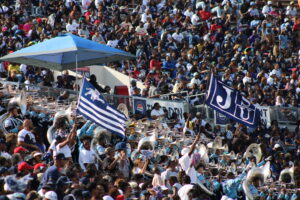
When Serdarion Locke took on the role of athletic compliance director at Jackson State University (JSU), he quickly realized that the world of name, image and likeness (NIL) was not the same outside the Power Four institutions.
“The opportunities in general regarding NIL look different for our HBCU (Historically Black Colleges and Universities) student-athletes,” Locke said.
The NCAA’s approval of NIL in 2021 allowed student-athletes to profit from their personal brand. But for athletes at schools like JSU, navigating this space has been particularly challenging. Locke, who had previously worked at Western Kentucky University and UNLV, said HBCUs often lack resources for educating athletes about NIL.
“At UNLV, we had five full-time staff members and four graduate assistants. Here at Jackson State, we just have two full-time staff members,” Locke said.
According to Locke, that puts HBCU athletes at a disadvantage when it comes to profiting from NIL rules.
Locke said HBCU student-athletes often do not know how to build their personal brands and secure partnerships.
“They don’t really understand how they can get deals and what that looks like,” Locke said.
While athletes at Power Four schools often receive extensive support from dedicated departments, at JSU, those responsibilities fall on the compliance staff.
“You’re essentially putting more work on the same number of people within your athletic department,” Locke said.
Yet, the Jackson State Tigers have been luckier than most — thanks to former JSU Football Head Coach Deion Sanders.
“When (Sanders) was here, it absolutely had an effect, not only here at Jackson State but across the HBCU landscape,” Locke said. “Since he’s departed, a lot of that attention has followed him to Colorado, but we still have a ton of people that continue to follow Jackson State football and Jackson State athletics.”
Maintaining that momentum has proven difficult after Sanders’ exit, but JSU running back Ahmad Miller has had some NIL success.
“I do little side deals for different companies through apps, but not anything major right now,” Miller said. “For sure, yeah, it’s very beneficial.”
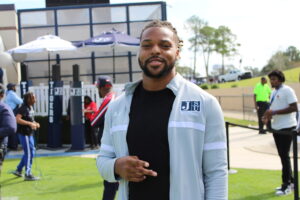
Photo courtesy: Janelle Minor
JSU has multiple NIL collectives and partnerships for their athletes, which puts them ahead of many HBCUs in the state. Still the Memphis native says the choice to come to JSU was about finding a family, not just about potential earnings.
“(JSU) showed a lot of love. It was just, without question, one of the spots I had to come to,” Miller said.
Ahmad’s brother, Aubrey Miller Jr., also played football at JSU, and though Ahmad recognized that athletes often can get better NIL deals at Power Four schools, he sees value in being at JSU.
“It’s not about the money for me,” Miller said. “I love the game of football and building connections, genuine connections.”
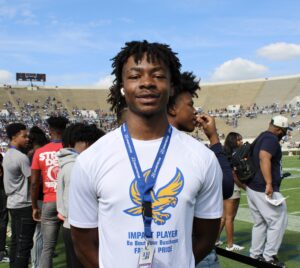
Photo courtesy: Janelle Minor
Joel Fleming is a senior linebacker and wide receiver at Velma Jackson High School in Camden, Miss. He said potential NIL earnings will not change his college decisions.
“No, not at all. I know what I wanna be. I know where I am going to be,” Fleming said.
North Carolina Central University and Howard University are already recruiting Fleming, along with Jackson State. He said he just wants the opportunity to be great at his sport.
“Whoever gives me the opportunity, I’m gonna show them what I can do,” Fleming said.
Tyquereis Wilson, a senior defensive end at Union Parish High School in Farmerville, La., echoed some of the same sentiments on his recruiting trip to JSU.
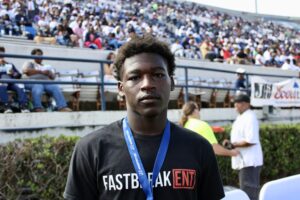
Photo Courtesy: Janelle Minor
While Wilson knows some people just evaluate the financial aspect, Wilson said other factors matter to him.
“(I want) a place to be supported and a family that just looks after each other,” Wilson said.
Fleming and Wilson both have the opportunity to find that family on game days in the parking lot of the Mississippi Veterans Memorial Stadium in Jackson, Miss., with JSU Tigers fans like Jesse and Shavon Austin.
“The reason we actually come out here is for them to see that they have our support. When they drive up on the lot, they need to see us. They need to know that we are depending on them, and we’re pushing them to win and be the best that they can be,” Shavon said.
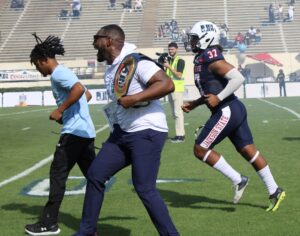
The Austins have been supporting the team for 20 years.
“It’s a big old family reunion,” Shavon said. “You look around, and we just see people that we went to school with and hadn’t seen in years. But we just pick up where we left off.”
Curtis Stapleton, a member of the JSU Association of Alumni Athletes, appreciates the emphasis on the love of the game and support for the athletes he sees on his campus. He said he believes that NIL has the possibility to distract coaches from supporting student athletes holistically.
Stapleton is a former All-SWAC offensive lineman and has worked as a collegiate and high school football coach in Mississippi and Alabama.
“I’ve talked to college coaches when I’m trying to get my players recruited. (They say) that they’re looking for kids that are ready to play right now,” Stapleton said. “They don’t have the time to develop a high school player.”
Stapleton, who was an assistant coach on Alabama State University’s 1991 national championship team, encourages current HBCU coaches not to get discouraged if they struggle to recruit top players in this new era.
“You’re not going to get your top players — those FBS and the group of five going to get the real, top players,” Stapleton said.
However, Stapleton said the coaches might get something even better.
“They’re going to be more committed and dedicated to that school than this hot shot that’s coming from (another) college,” Stapleton said.
Locke remains optimistic about the potential for growing NIL opportunities at HBCUs
“There’s a lot of money out here for them,” Locke said. “They just have to put the work in to go and get it.”



























